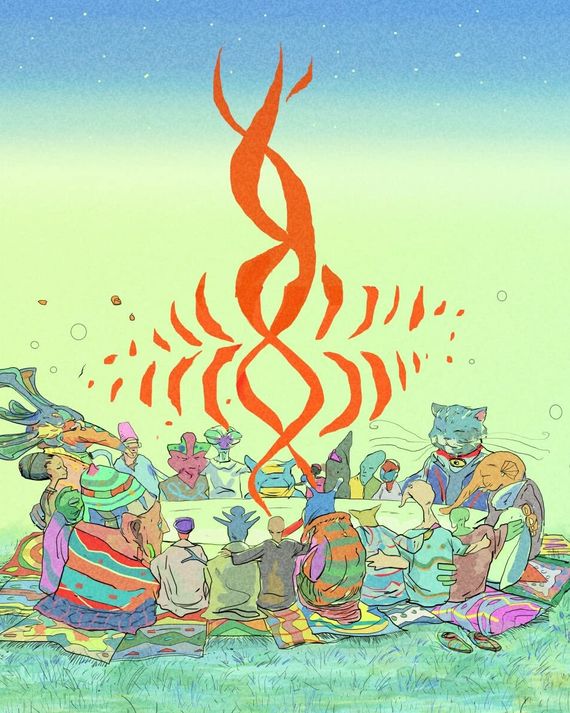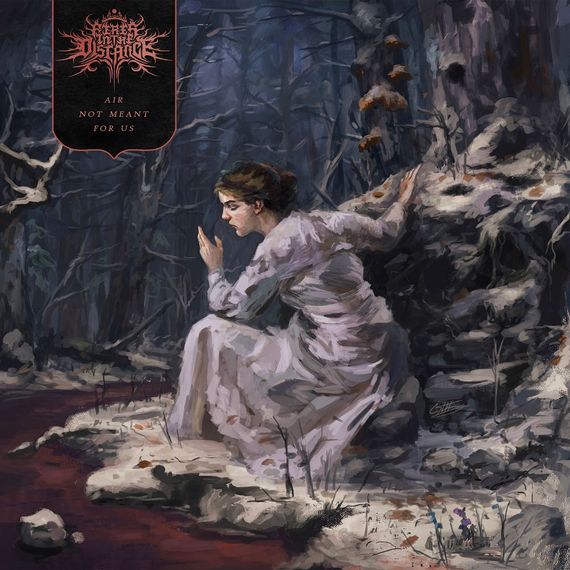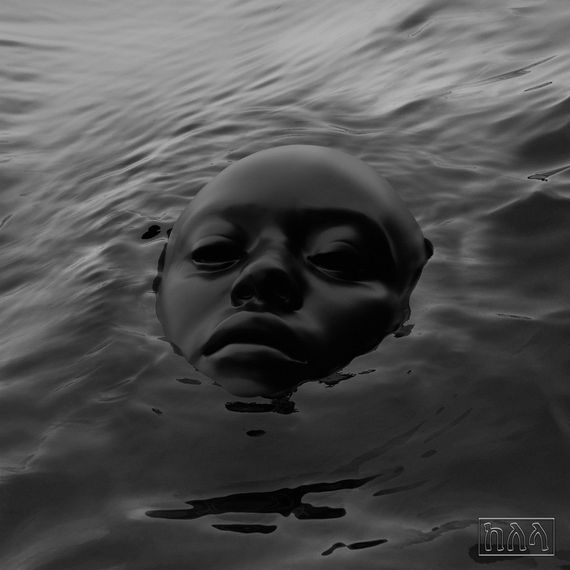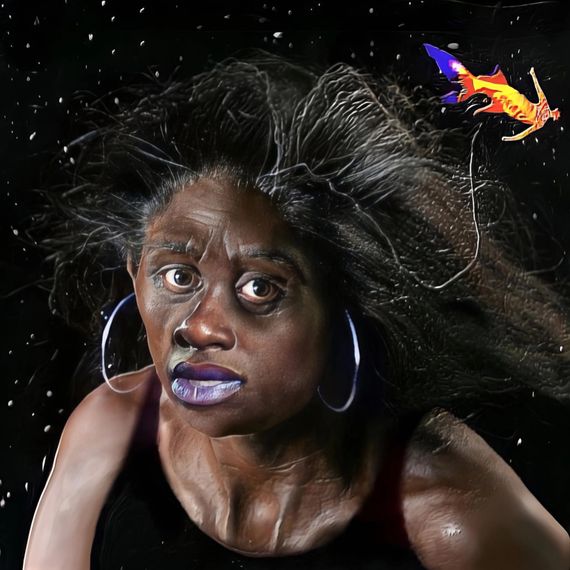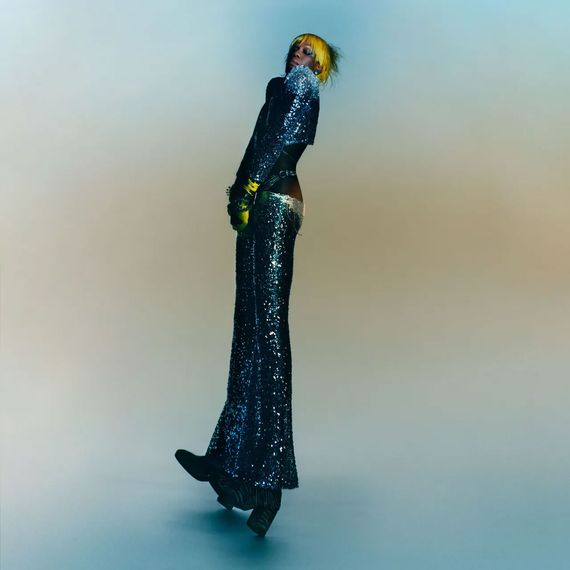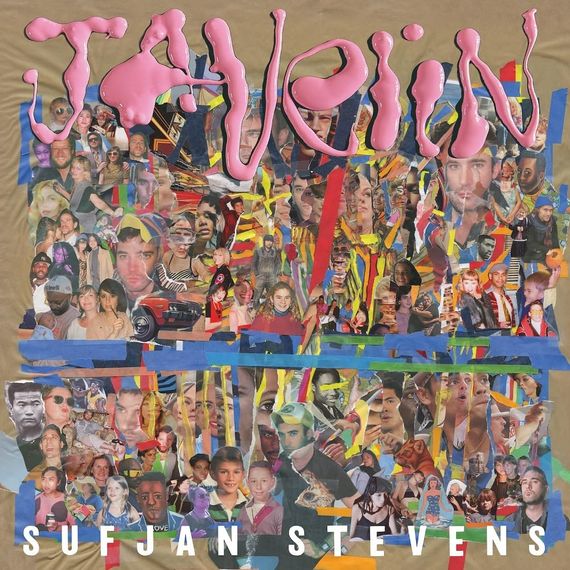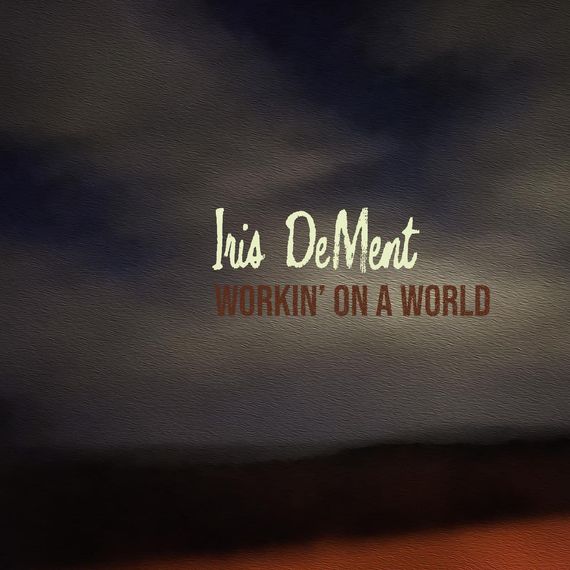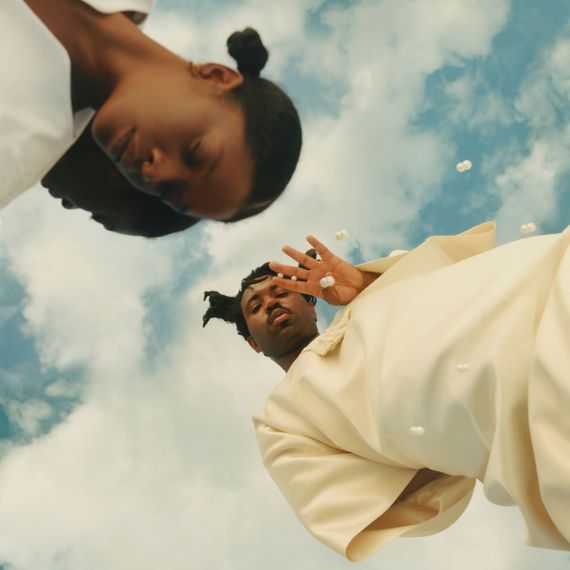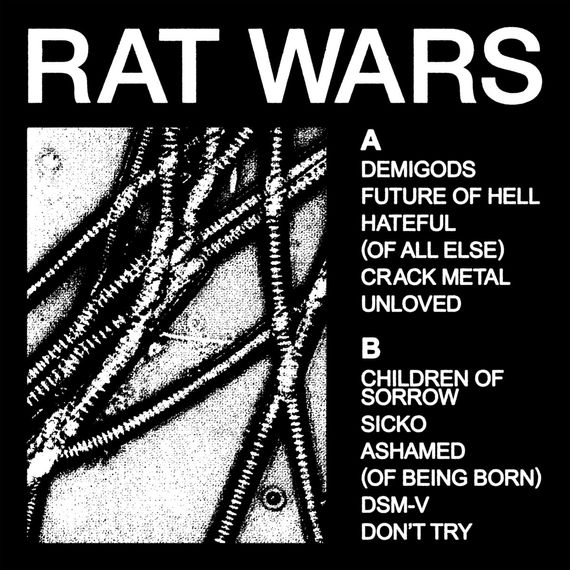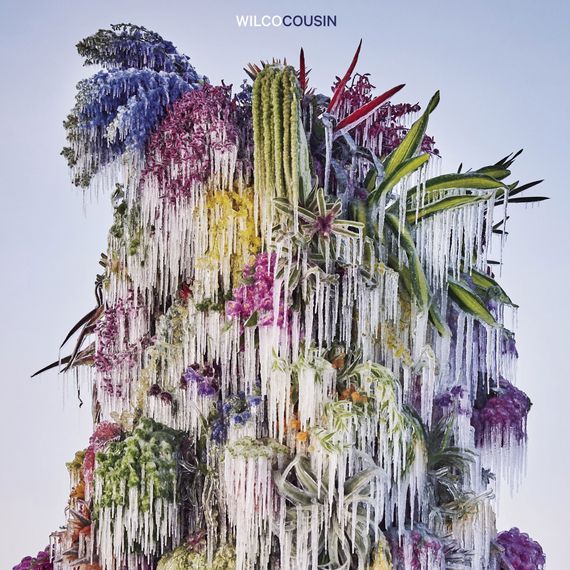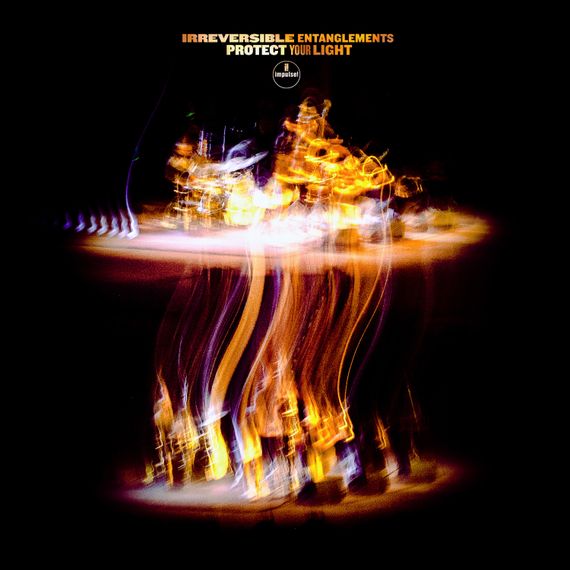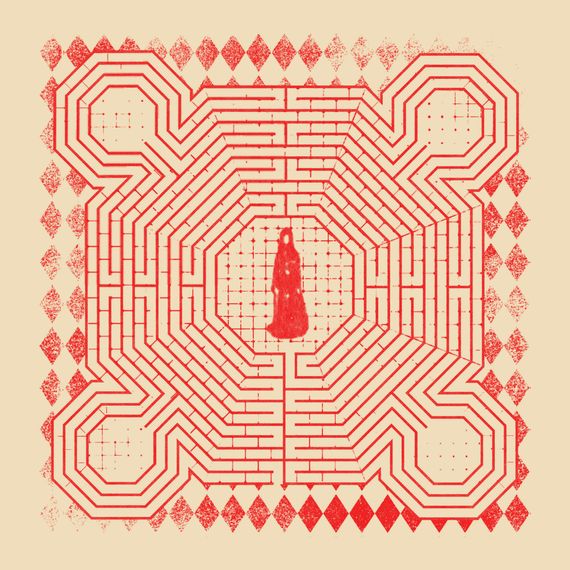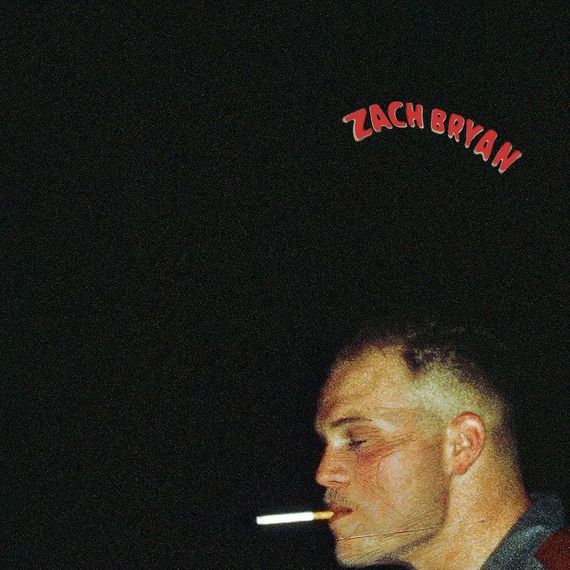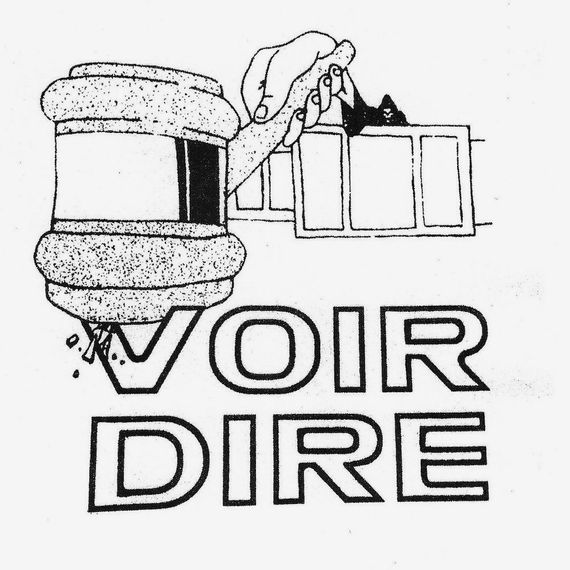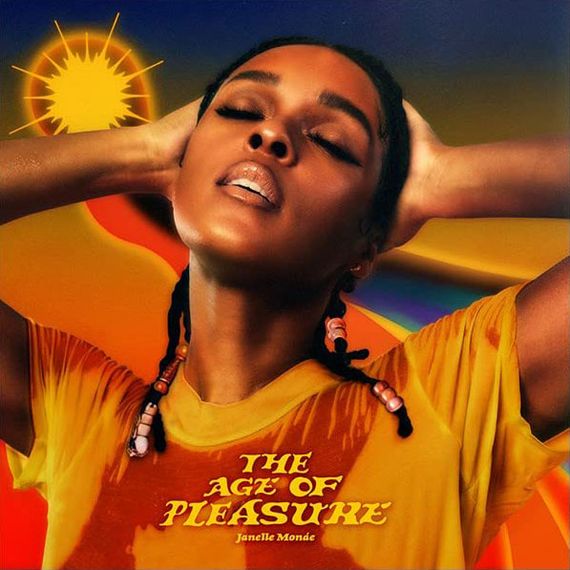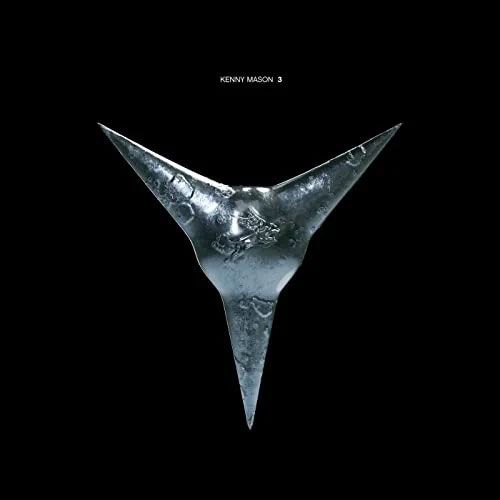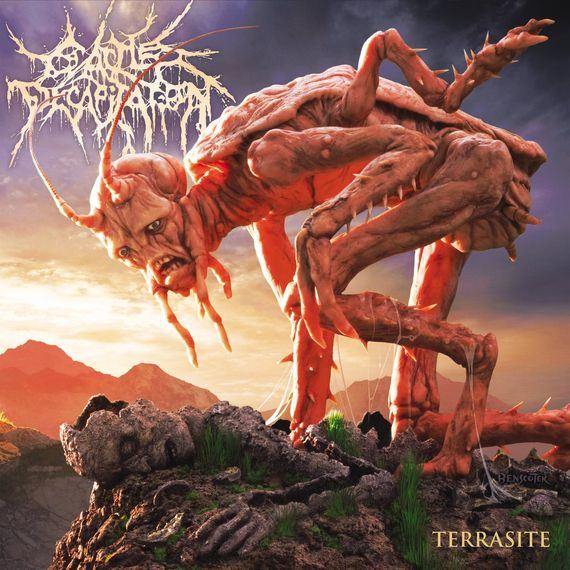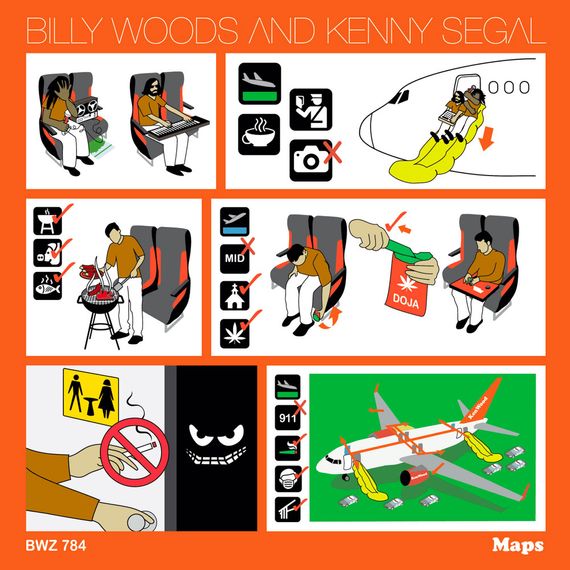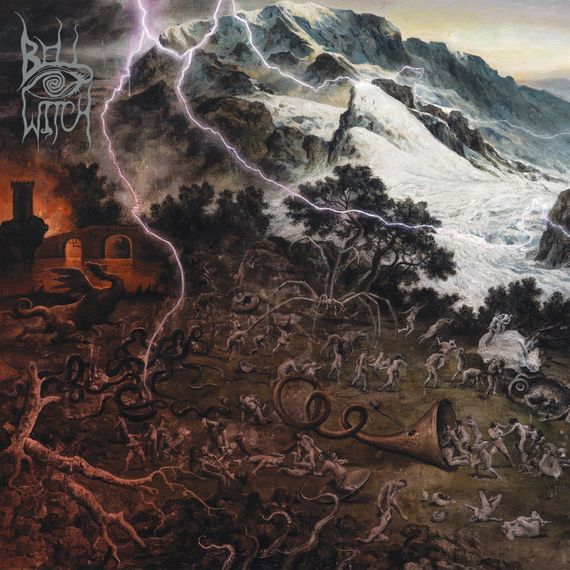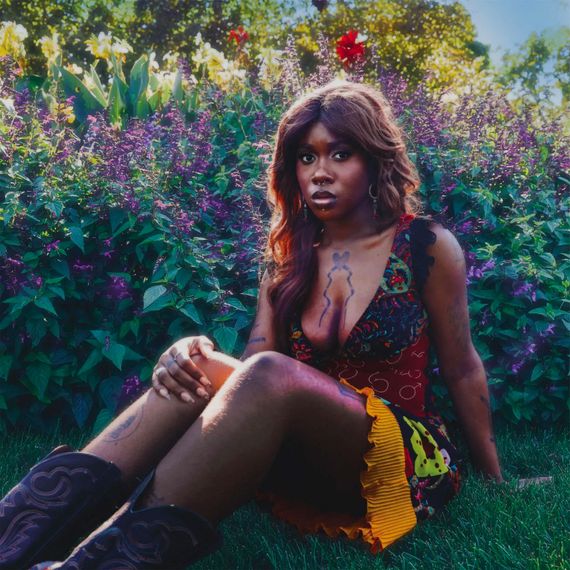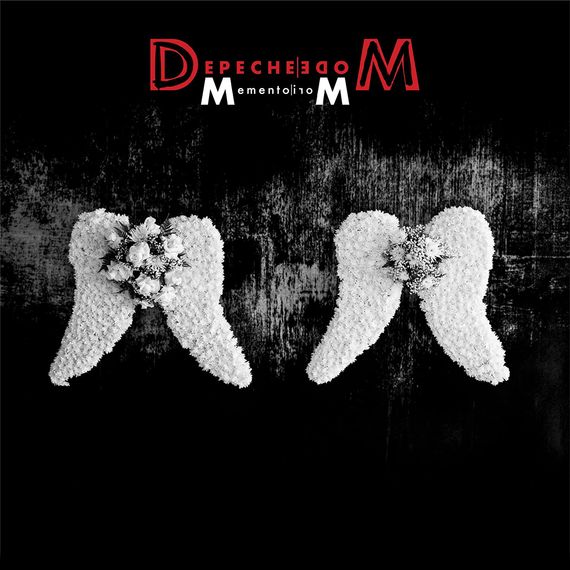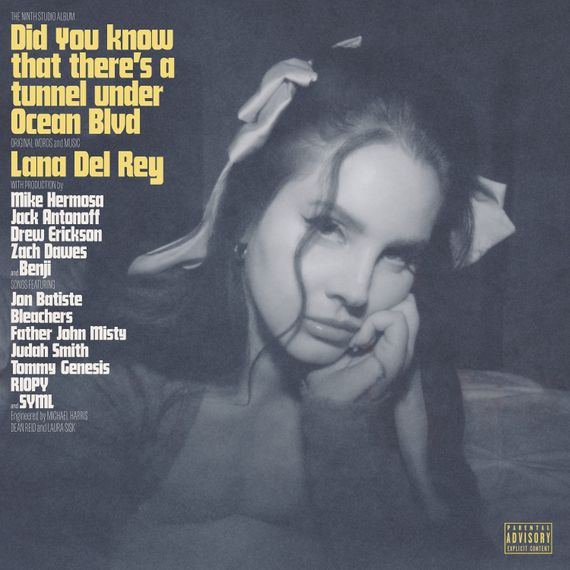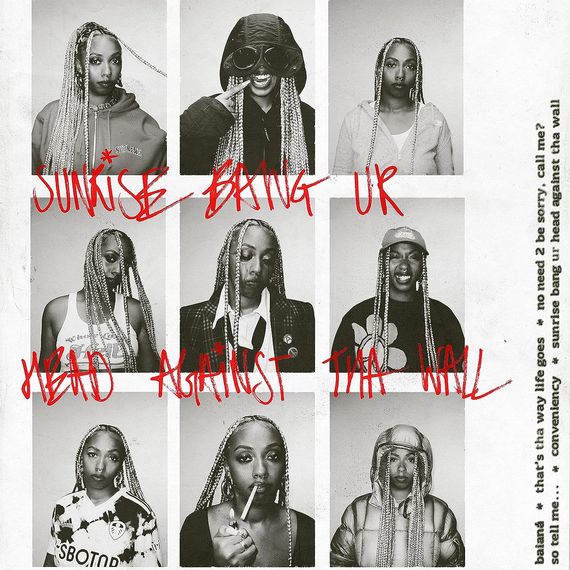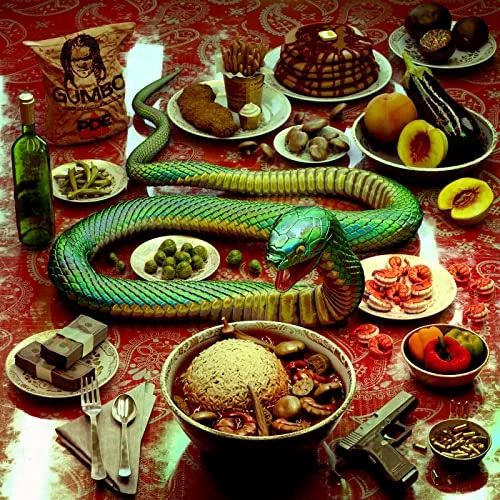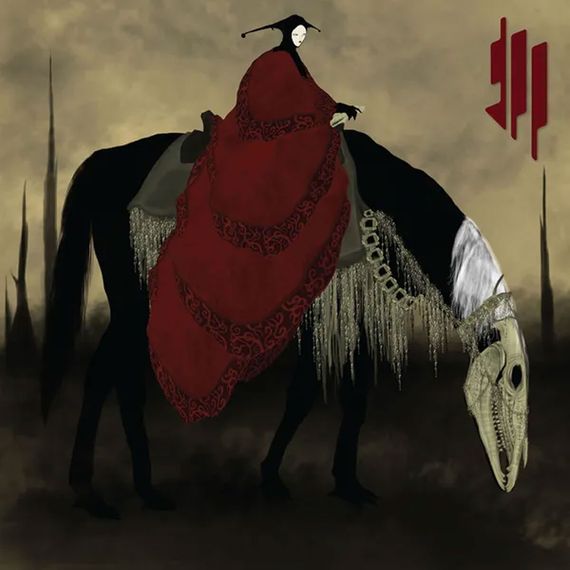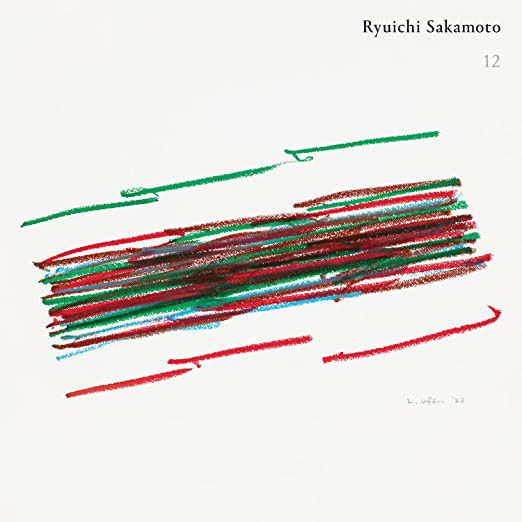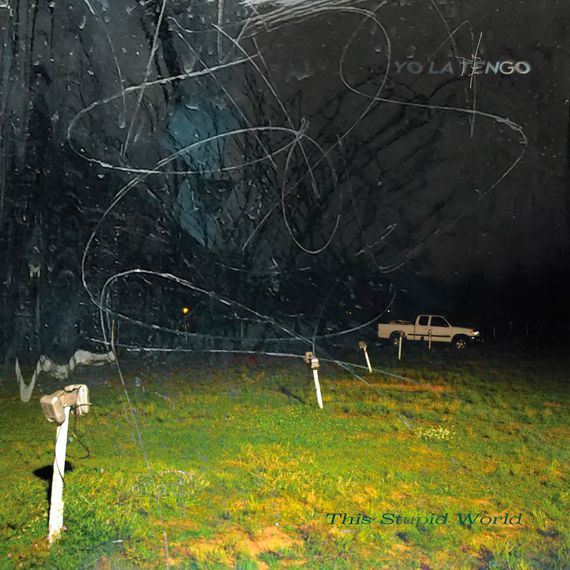
The best albums of 2023 devised a wealth of helpful solutions and coping mechanisms for our everyday problems. Pop offered glitzy escapism, and jazz and dance music luxuriated in the ever-unfurling present. Indie rock, folk, and country cut to the quick of various civic and emotional matters, while hip-hop paired activism with arrogance. Punk and metal surveyed disorder, while R&B, música urbana, and Afrobeats sought companionship. Another trip through the unpredictability matrix brought listeners together to celebrate the boundless creativity on display throughout the year and to mourn the countless legends lost since January. For every ending, there was a new beginning waiting to happen.
10.
James Holden, Imagine This Is a High Dimensional Space of All Possibilities
Having spent the last decade exploring spiritual jazz, film-score ambience, and Moroccan gnawa music, onetime trance wunderkind James Holden returns to the rave weirder and wiser on Imagine This Is a High Dimensional Space of All Possibilities. It is undisputedly dance music, but it feels like something that’s happening spontaneously rather than being tightly programmed, sequenced, and layered. Imagine is psychedelic in the way the lead wanders and the beat behaves more like a cell discovering its purpose through mitosis than a sturdy foundation for hypnotic grooves to jostle over. The hourlong album arrives at its thrills on its own terms. The descending bass riff of “In the End You’ll Know” takes two minutes to emerge from a cloud of reverb; “Continuous Revolution” slowly drowns a hypnotic groove in sweet noise. Years of electro-acoustic experiments paid off: Holden’s machines feel alive.
9.
Fires in the Distance, Air Not Meant for Us
Fires in the Distance began as a one-off side project from members of the Connecticut death-metal bands Engraved and Archaic Decapitator. Pushing out past the proggiest portions of everyone’s catalogue, Fires jelled on 2020’s ambitious Echoes From the Deep November, where synths and samples interacted with compositions that unfolded slowly, sometimes sacrificing heaviness to build tension. This year’s follow-up, Air Not Meant for Us, saw principal songwriter Yegor Savonin and producer Dave Kaminsky connect with composer (and TesseracT and Periphery collaborator) Randy Slaugh to build elaborate arrangements for the songs. The result is a rumination on hopelessness and dread that really lives and breathes in it. The over nine-minute “Crumbling Pillars of a Tranquil Mind” drifts through loud and quiet anguish, resignation setting in like breaking waves: “The hands of time spare none / Heartlessly ticking on and on, dismantling your bliss.” Air begins and ends in despair, but its melodic richness and wide dynamic range both leave a notably less somber impression (accentuated by the instrumental version). That tension is exhilarating.
8.
boygenius, the record
The Record is the rare supergroup release that catches its collective of notable players teetering on the cusp of a commercial breakthrough rather than coasting on the goodwill of past mainstream successes. Over the last decade, Julien Baker, Phoebe Bridgers, and Lucy Dacus came into their own as performers — Baker recounting a journey to sobriety while Bridgers juggled punchy rockers and shaky-voiced Elliott Smithisms, and Dacus sang about queerness and faith. Each artist having arrived at their own brand of devastating and thoughtfully produced truth-telling, they regale The Record with earnest narratives and confident hooks, singing of a world where friendship and guitar licks are enough to counteract whatever terrors you find yourself up against, and there’s little in this world as precious as a carefree car ride with the boys (non-gendered).
Read Craig Jenkins’s review of the record.
7.
Kelela, Raven
Raven, the sophomore album from D.C. artist and model Kelela, extols the virtues of patience, finally delivering another serving of the moonlit soul and futuristic beats admirers of her 2013 mixtape, Cut 4 Me, and her 2017 debut album, Take Me Apart, have ached for. The structures of the songs and the pacing of the album are an invitation to a new relationship to time. Raven is often in no rush to give up the goods. Many of the best grooves come together carefully, disparate parts clicking into place like components in an Oddly Satisfying video. Sometimes drums take forever to drop into a rhythmic current of buzzing synths — as is the case with late-album highlights “Fooley” and the title track — and sometimes you luxuriate in the enveloping sound bath for the full duration of the song. Kelela is equally commanding in the more traditional cuts — the jungle chune “Happy Ending,” the propulsive house-music heater “Contact” — and in the songs that communicate the same shipwrecked sensation Raven relays through its cover art.
Read Craig Jenkins’s review of Raven and Tirhakah Love’s interview with Kelela.
6.
Armand Hammer, We Buy Diabetic Test Strips
billy woods and Elucid raps are, like Hieronymus Bosch paintings, packed to the brim with both carnage and humor. Named after a lurid flier woods spotted in New York City, his and Elucid’s sixth album as Armand Hammer creates impressionistic images of dystopia one unsettling reality at a time. In the gauzy, jazzy “The Flexible Unreliability of Time & Memory,” Elucid objects to the absurdity of proving his identity to robots, while woods suspects that the hypermasculine, homophobic intellectuals of our day would likely reject the next James Baldwin. Test Strips looks in on modern chaos and romance, its abstractions and observations set to beats from JPEGMAFIA, El-P, and more that feel freewheeling but also carefully produced thanks in part to a backing band including former Sons of Kemet leader Shabaka Hutchings and regular woods and Elucid collaborator Child Actor. As new and old friends mingle, so do sounds and ideas. The slithering “Don’t Lose Your Job” unites Ohio rapper and singer Pink Siifu, poet and Irreversible Entanglements vocalist Moor Mother, and producer Black Noi$e (Earl Sweatshirt, Zelooperz), typifying the intersecting brilliance Test Strips and the overarching Backwoodz Studioz universe can offer.
Read Craig Jenkins’s interview with billy woods.
5.
Noname, Sundial
Rapper and sometime librarian Noname’s records are celebrated for their resistance to the horrors of the world. But they increasingly seem interested in picking the brain in between the headphones, figuring out what we’re doing here and what motivates us to listen to songs about Black death and oppression. Where her 2018 debut album, Room 25, sought solace from violence and inequality, her second album, Sundial, is interrogating itself and its audience as much as anything else. The satirical “Hold Me Down” balks at the depravity of racist, capitalist systems but also prods people who get too cozy with the notion that they’re on the right side of history: “We keep our babies fed / We don’t beat and rape on our women, we good / We is Wakanda, we Queen Rwanda / First Black president and he the one who bombed us.” “Namesake” suggests that doing shows for the NFL is, by the transitive property, aligning with military propaganda; the rapper also kicks herself for playing Coachella. If faith is a mustard seed, as “Gospel?” insinuates, Sundial is a poignant reminder that fostering growth requires deep time and commitment, ample air and sunlight.
Read Craig Jenkins’s review of Sundial.
4.
Yves Tumor, Praise a Lord Who Chews But Which Does Not Consume; (Or Simply, Hot Between Worlds)
Opening a Marc Jacobs–sponsored Deftones gig with a DJ set back in March, the genre-immolating Yves Tumor delivered more squealing noise than immediately recognizable hits, waving middle fingers at an agitated audience on the way out. That juxtaposition of style and decay, that dirtying of pretty things, is key to grasping Tumor’s music. This year’s Praise a Lord Who Chews But Which Does Not Consume; (Or Simply, Hot Between Worlds) dresses gorgeous hooks in gritty fuzz and brash distortion. Buffeted by tart, abrasive love songs like “Heaven Surrounds Us Like a Hood,” you understand why ’90s rock royalty like Courtney Love are taking notice. Steering these grunge, glam, and synth-punk vehicles are lyrics pondering the actions we take to find fulfillment in desperate times. “Meteora Blues,” which would’ve crushed between Adrenaline and Live Through This tracks on ’90s alternative radio, looks to a lover for validation, feeling like prayers are going unanswered. “Parody” peers into the private life of a pop star dedicated to performance but also awful attention-seeking behavior. Everyone is trying to find something to plug a nagging hollowness haunting their interior world.
3.
Sufjan Stevens, Javelin
Having spent the last five years stretching out in the vastness of his creativity — and leaving an intimidating trail of unpredictable genre experiments in his wake — Sufjan Stevens ties it all together on his tenth studio album, which fuses intimate folk with the psychedelic maximalism of 2010’s The Age of Adz and the mournful ambience of 2021’s Convocations. Dedicated to Stevens’s late partner, Evans Richardson, Javelin balances songs touching on loneliness and resolutions to treat loved ones better, simplifying matters of the heart while consolidating contrasting musical ideas into a unique patchwork almost entirely written, played, and produced by Stevens himself. He’s looking in on the moods of past releases, but the Christian folkie who made Seven Swans couldn’t hack the crispness of the electronic and orchestral breakdown Javelin’s faithful “Everything That Rises” explodes into at the end. And while the bombast of “Shit Talk” recalls the lush twee pop of Illinois, the exhausted headspace is more of an extension of Convocations and 2015’s Carrie & Lowell, albums Stevens made mourning each of his parents, and indicative of an enduring gift for abating sorrow with sweetness.
Read Craig Jenkins’s review of Javelin.
2.
Iris DeMent, Workin’ on a World
Singer-songwriter Iris DeMent — real name, no gimmicks — reacts to the tumult we’ve all seen since 2016 on Workin’ on a World, a song cycle about mustering the bravery to love and fight for what’s right even when it feels politically and socially radioactive to do so. “I’m going down to sing in Texas, where anybody can carry a gun,” she huffs in “Goin’ Down to Sing in Texas,” a meditation on paranoia and Islamophobia. Her weapons of choice are wit and warmth: “Go ahead and shoot me if it floats your little boat / But I’ll live by my conscience even if that’s all she wrote.” DeMent’s seventh album sweetens its survey of everyday nightmares like bigotry, gun violence, and climate denial with expressive vocals and delicate piano playing in and out of band numbers like “Nothin’ for the Dead,” a beautiful blend of country pedal steel and soulful brass accompaniment. “There’s no separating the good stuff from the bad,” “Nothin’” argues, so DeMent peppers her lists of pet peeves with celebrations of the iron resolve of Mahalia Jackson, John Lewis, the Chicks, Rachel Corrie, and anyone willing, as “Warriors of Love” puts it, to “risk an early ride in a hearse.”
1.
Sampha, Lahai
Following an enticing trail of high-profile guest spots on albums from Solange, Stormzy, Kendrick Lamar, Travis Scott, and Drake, U.K. singer-songwriter and producer Sampha released his sophomore album, Lahai, a celebration of family and fatherhood but also an alluring development in the ongoing quest to blur the lines between compositions crafted with machines and music made on organic instruments. Piano chops and programming smarts bless songs like “Dancing Circles” and “Suspended” with clattering beats and robotically precise playing that tug gently against the R&B love songs they provide foundation for, the smoothness of the vocals offset by the jitteriness of the percussion. A genuine interest in science informs the metaphors about flight and travel that drift in and out of these songs, giving a sense that this artist renowned for spontaneous hooks and deeply considered writing is simply trying to stake out a place of peace for himself and his kin somewhere in the infinite expanses of the universe. Lahai is the point where curiosities about nature, space, and domestic bonds merge with technological know-how, a flair for an airy vocal melody, and keen studies of international rhythmic traditions, decades of sea changes in U.K. dance music, African funk, and American folk and soul. It’s a delicate musicology lesson about the sounds that connect cultures across continents couched in a contemplation of man’s place in the grand scheme of life in the cosmos. It is the music Sampha was born to make.
Read Craig Jenkins’s interview with Sampha.
Other Album Highlights From This Year
Throughout the year, Vulture maintained a “Best Albums of the Year (So Far)” list. Many of those selections appear above in our top ten. Below, the rest of the albums that stood out this year, presented in order of release date.
SZA, SOS
SZA’s sophomore album was a full-court press, a showcase of the New Jersey artist’s gifts in a few permutations. The mix of yearning soul and vindictive R&B/pop that elevated Ctrl to blockbuster status in 2017 resurfaced in “Kill Bill” and “Shirt,” but SOS brought more to the table. “Ghost in the Machine,” “F2F,” and “Nobody Gets Me” dabbled confidently in folk-rock and pop-punk, and rap verses in “SOS,” “Smoking on My Ex Pack,” and “Forgiveless” validated the singer’s affiliation with the rhyme geniuses on the TDE label. Navigating hurt and haughtiness, feeling like the Gone Girl one minute and Bad Boys’ Mike Lowrey a few later, SZA released days after the publication of our 2022 list but still loomed large over the early months of 2023.
HEALTH, Rat Wars
After working with everyone from Nine Inch Nails to 100 gecs on last year’s sprawling double album (and supplementary remix project), Disco4, industrial rockers HEALTH tighten up a little bit on the more concise though no less eventful Rat Wars. On the Los Angeles trio’s fifth album, dark thoughts mesh with enticing melodies, and harsh, distorted noise is draped in soft sheets of reverb. The purview is bleak: “The future is here / And there’s no way out,” “Don’t Try” warns. But the sound design and production are almost playfully ambitious, particularly in the back half, where “Sicko” samples Godflesh’s “Like Rats,” “Ashamed” serves atmospheric R&B, and “DSM-V” scratches the White Zombie itch with a brisk groove-metal stomp.
Danny Brown, Quaranta
Embracing sobriety this year after a decade of hard partying and lurid raps about deranged nights out and the remorseful mornings that follow, Detroit rapper Danny Brown left us one last dispatch from a more chaotic period in his life, an album where the colorful antics of old came effortlessly but so did hard-won self-awareness. Quaranta is a document of life in flux, a jagged trek from the madcap moods of XXX to a more relaxed and health-conscious lifestyle. It doesn’t skimp on recklessness — “Smokеd with Dave Chappelle, the nigga think I laced him / Knew it was the pack, he started talkin’ ’bout spaceships,” “Dark Sword Angel” snaps — but as it tiptoes away from theatrics, we’re treated to increasingly personal reflections about childhood adversity and the day-to-day pains of getting older in a rapidly evolving world.
PinkPantheress, Heaven Knows
U.K. singer-songwriter and producer PinkPantheress’s debut album, Heaven Knows, conjured video-game worlds of the mind with a winning mix of soothing sonics, swift tempos, and earnest lyrics. Building on the airy early-aughts nostalgia driving her 2021 mixtape, To Hell With It, where garage beats and Linkin Park samples cohabitated, Pantheress took a stab at crafting weightier songs, giving her melodies more space to grow and resolve and tapping an international group of guests — Ice Spice, Central Cee, Mura Masa, Kelela — to tease out the global scope of her interests. Heaven Knows navigated international trends in Afrobeats, R&B, drill, and pop music (as well as classic K-pop and 2-step) with the grace of a platformer.
Cleo Sol, Gold
On her fourth full length, Gold, London singer-songwriter Cleo Sol of the U.K. R&B collective Sault links up with producer Inflo (Little Simz, Michael Kiwanuka, Adele) for a ten-song meditation on love and faith. Sol pursues gospel themes using the aesthetics of funk and soul music, landing on a more sedate rendering of the delightful slipperiness of legends like the Staples Singers, moody piano notes trickling over tracks that sound almost sensual until their messages of hope and perseverance connect. In the event that you are in need of a gifted singer whispering sweet promises that things will eventually get better for you, and “There will be no crying in a river full of dreams,” and “You’re gonna find your way,” Gold has you covered.
Wilco, Cousin
Last year’s darkly serene Wilco album, Cruel Country, came about in the middle of work on another, trickier project. In retrospect, that album’s roots-rock immediacy seems like a bit of an adverse reaction to the intricacy and precision this year’s Cousin, the Chicago band’s 13th album, required. Breaking a decade-long streak of overseeing its own production to varying degrees, Wilco sought out Welsh artist Cate Le Bon, who coached individual members through parts and offered feedback. Cousin finds a band shaking itself out of a cycle of reliable consistency one quirky instrumental flourish at a time. From the majestic, proggy riff in “Ten Dead” to the post-punk stomp of the title track to the clacking rocker “Infinite Surprise,” it is a joy to hear the Yankee Hotel Foxtrot and A Ghost Is Born crew leaning into hooky weirdness again.
Irreversible Entanglements, Protect Your Light
Free jazz quintet Irreversible Entanglements met at a 2015 Musicians Against Brutality event and gelled across three studio albums balancing the vocal alchemy of poet, producer, and performer Moor Mother and the smoldering interplay between Exposure Quintet leader and bassist Luke Stewart, saxophonist Keir Neuringer, and trumpet-and-drum duo Aquiles Navarro and Tcheser Holmes. Protect Your Light, the Entanglements’ fourth album (and their first on Impulse! Records, which released John Coltrane’s A Love Supreme and Charles Mingus’s The Black Saint and the Sinner Lady), rethinks formulas while delivering the expected thrills. Light touts tighter compositions than its 74-minute predecessor, Open the Gates, but the driving title track and the indignant “Celestial Pathways” — “We can burn it all down / This is ours” — are proof this group can bring a groove to a boil as astoundingly in three minutes as it often does in ten.
James Blake, Playing Robots Into Heaven
After spending his last two albums exploring the pop and trap sounds that yielded winning collaborations with Frank Ocean, Beyoncé, and Jay-Z, James Blake returns to form on Playing Robots Into Heaven, his sixth album, which bears a closer resemblance to the jittery vocal manipulation and patient, purposeful beat construction of R&S Records EPs CMYK and Klavierwerke than the bubbly love songs and big-deal guest features of 2019’s Assume Form and 2021’s Friends That Break Your Heart. Massive lead single “Big Hammer” snakes menacingly to a fiery verse from U.K. jungle vets the Ragga Twins, and the hook on “I Want You to Know” stages vocal gymnastics over an interpolation of Snoop Dogg and the Neptunes’ “Beautiful.” The euphoric build-ups and jarring twists in “Tell Me” and “Loading” feel like a homecoming.
Slowdive, Everything Is Alive
The 2017 comeback album from U.K. shoegaze pioneers Slowdive was a dream scenario: a band whose transcendent hot streak happened a quarter century ago adding something potent to a beloved, compact back catalogue. Slowdive rekindled the fire in the band that perfected the blending of shimmering noise and gossamer vox on Souvlaki in 1991, and this fall’s unexpected follow-up, Everything Is Alive, accomplishes another stellar feat as it transmutes pain and grief into moments of hard-won emotional release like the jangly but dour “Alife” or the glacial, majestic “Prayer Remembered.” The album started as a side project for singer-guitarist Neil Halstead, something to apply himself to while bandmates navigated the loss of parents. Here, they flesh out his synthesizer compositions gorgeously, changing direction delicately as chillier sonic textures collide with sizzling guitar work, and coating Everything in hazy, storm-cloud grays.
Zach Bryan, Zach Bryan
Plop 27-year-old Oklahoma singer-songwriter Zach Bryan down in any era of American roots music and he would probably take off. Zach Bryan, his fourth album, dabbles in the bombast of ’80s heartland rock, the downcast desolation of ’90s alt-country, the scrappy, ornate folk tunes aughts indie rockers favored, and the fedora rock of the ’10s. He can do Mellencamp; he can do Whiskeytown; he can do Bright Eyes. He sounds cozy in a Lumineers duet. But Bryan’s balance of bluster and private tenderness is true to the experience of modern man and the unexpected pinpricks that come along to deflate outsize confidence. Zach’s playing the country career game his way, singing about Klonopin and cussing at cops. If he avoids a Morgan Wallen type of gaffe, he’ll be around a long time; he’d still be around a long time if he couldn’t.
Voir Dire, Earl Sweatshirt and the Alchemist
Earl Sweatshirt and the Alchemist are kindred spirits, indie-rap figureheads who cut their teeth on rugged boom bap sounds but took a sharp left turn into delightfully weird minimalism and hypnotic sample loops. Al’s penchant for beats that seem built around chops that eschew programmed drums and Earl’s abstract storytelling and elastic sense of timing meshed perfectly in past collaborations like “Elimination Chamber” and “E. Coli,” and rumors of a secret album-length team-up were confirmed with the release of Voir Dire, whose stir-fried ’70s soul and poetic repose are as warm and inviting as actual voir dire is cold and drab.
Aphex Twin, Blackbox Life Recorder 21f / In a Room7 F760
The inimitable, unknowable Irish British wizard Richard D. James resurrected Aphex Twin for its first release since 2018’s Collapse EP with Blackbox Life Recorder 21f / In a Room7 F760. The 909s (?) in “Blackbox Life Recorder 21f” expand at dangerous speeds, like a virus, frenetic kicks and snare hits never quite seeming to repeat what they did in the last measure, like jazz. The serenity in the clearing at the end of the song is a reminder that this is the same Aphex who famously selected ambient works; the jittery electro jam “In a Room7 F760” says your IDM titan can still appreciate the simple thrills.
The Ballad of Darren, Blur
The Ballad of Darren, the ninth album from Britpop pioneers Blur, catches four friends reconvening in their 50s to tackle daunting adult problems — the end of romance and the onset of middle age — while revisiting the stately melodicism of their impactful early ’90s. Singer-songwriter Damon Albarn isn’t slowing down by any means; Darren is his second album of the year after Gorillaz’s Cracker Island. But he is trying to learn to be content with the life he built for himself, even while the album’s dejected slow songs ponder nagging loneliness. The band seems to lift his spirits. “St. Charles Square,” “Goodbye Albert,” and “The Heights” flood the mix with psychedelic guitars and propulsive rhythms, adding vibrant textures to the melancholia.
Babyface Ray, Summer’s Mine
Summer’s Mine, the third album from Detroit rapper Babyface Ray, zips through triumphs and tragedies as the rapper makes it to the end of every line sounding lackadaisical but always arriving on time. It’s an audacious album title, but one that Ray sells with every pained, breakneck performance, like “Life Full of Lies” — “I went to Selfridges, man I had a private room / I never saw the shoppers, I’m trying to buy some shoes / I’m mixing codeine, I’m scared to try the food” — which highlights the contrasts between prosperity and promethazine-drenched excess, and between the lightness of Ray’s voice and the depths of his pain.
Paris Texas, Mid Air
Mid Air, the debut album from the Los Angeles duo Paris Texas, blends distorted guitars and synths with introspective and insouciant raps, doubling down on the most ominous sounds in 2019’s Boy Anonymous mixtape but showing that there’s more to rapper-producers Louis Pastel and Felix than ire. “Full English,” “Everybody’s Safe Until …,” and “Sean-Jared” sell cavalier punk-rap, but the stress in the quieter “Ain’t No High” and “Closed Caption” — “Working so hard / You forgot to grieve — makes the rage look like bravado.
Janelle Monáe, The Age of Pleasure
After three albums of futuristic, philosophical funk — works like 2010’s The ArchAndroid, which imagined whole worlds of sociopolitical intrigue — singer-songwriter, author, and actor Janelle Monáe has declared 2023 to be The Age of Pleasure on album four, a fleet song cycle more concerned with moving the body than the brain and a sultry survey of recent developments in hip-hop, R&B, reggae, Afrobeats, and more.
Read Craig Jenkins’s review of The Age of Pleasure.
Amaarae, Fountain Baby
Bronx-born singer-songwriter, rapper, and producer Amaarae embodies the versatility of experiences and musical tastes to be found uptown. The Ghanaian American star — whose youth was split between stints living on the East Coast and in Accra — uses a sprawling sophomore album Fountain Baby to chart a winding course through modern mainstream music, stopping in Afrobeats, rap, R&B, pop, and more. In a three-song streak mid-album, Fountain Baby barrels through the cocky Clipse fan service of “Counterfeit,” the uptempo dejection of “Disguise,” and the loud-quiet shifts in the fever dream “Sex, Violence, Suicide.”
Jason Isbell and the 400 Unit, Weathervanes
Over a decade into his sobriety journey and his marriage to the Highwomen’s Amanda Shires, Alabama troubadour Jason Isbell reflects on a storied past on Weathervanes — his sixth album with the 400 Unit, his and Shire’s longtime band — not out of shame or a longing to go back but in a spirit of wondering what sorrow a cooler head might’ve abated. Church values and teenage hormones collide in the gutting “White Beretta,” a recollection of the aftermath of an abortion: “I thank God you weren’t brought up like me, with all that shame and certainty / And I’m sorry you had to go in that room alone.” In the redolent “Strawberry Woman,” Isbell sings of stumbling into love and grace: “Wеll, the highway’s straight and the night’s so still / Barely havе to touch the wheel / But it hurts to move and it hurts to learn / I just kept on going when I made a wrong turn.” Life can be good, Weathervanes supposes, if you commit to working for it.
Kenny Mason, 3 and 6
Following collaborations with J. Cole and Lil Wayne last year, Atlanta rapper Kenny Mason grapples with success on the 3 and 6 EPs, detailing his dreams and nightmares in cuts like “Rich,” a song somewhat ill at ease about the artist’s good favor, and “Avatar,” where a pay increase comes with an unexpected jolt of fear: “I woke up clutching my gun in my dream / I woke up focused on money this week / To make what you make in a month in a week.” By linking with Young Nudy affiliate Coupe for the majority of these songs, Mason dances in tight triplets over beats that borrow as much from Smokey Robinson as from indie rock.
Cattle Decapitation, Terrasite
This year, rising ocean temperatures cooked coral off the Atlantic coast while winds carried rancid wildfire smoke across continents. What if, San Diego extreme-metal veterans Cattle Decapitation suggest across their eighth album, Terrasite, it was a mistake to turn us loose to multiply and overpopulate? What if we’re just like termites, and the consumption of our planet’s resources is our destiny, our biological imperative? Terrasite makes a convincing case, spicing blackened death metal and grindcore with clean vocals and synths in cuts like the thunderous “The Insignificants,” a thesis of sorts: “We have always been the virus.”
billy woods and Kenny Segal, Maps
Hailing from New York City by way of Washington, D.C., and Zimbabwe, rapper and Backwoodz Studioz label head billy woods is a writer with an expansive purview and a rhymer with a seemingly inexhaustible supply of intriguing flows. Maps, his second collaborative album with L.A. producer Kenny Segal, turns the experience of touring the world into a kind of hero’s journey, a story of zany inklings and occurrences coming between the traveling musician and the comfort of home.
Read Craig Jenkins’s interview with billy woods.
Bell Witch, Future’s Shadow Part 1: The Clandestine Gate
Future’s Shadow Part 1: The Clandestine Gate, the fifth album from Seattle doom-metal duo Bell Witch, is a careful step forward for singer-bassist Dylan Desmond and singer-drummer Jesse Shreibman. It’s an 83-minute continuous song cycle inspired by reading Nietzsche and watching the unnervingly patient films of Russian director Andrei Tarkovsky, it’s a meditation on the promise and dread that greet us each new morning, and it’s a massive expanse of swelling organ drones, beguiling poetry, and triumphant riffs, the opening act of a planned triptych. While Clandestine Gate’s dawn illuminates fields of pulsing worms and decaying corpses, one wonders what terrors await as Future’s Shadow creeps into the twilight hours.
Everything But the Girl, Fuse
Tracey Thorn and Ben Watt hung up their successful musical collaboration Everything But the Girl in 2000 after they became parents to twins and band engagements began to clash with familial obligations. 2020 cleared their schedules, and they put parallel careers as authors and solo artists on halt to craft Fuse, the 11th Everything But the Girl album and a careful comeback that pleases admirers of the plaintive, elegant dance-pop of “Wrong” and “Missing” while sharpening the writing and gently modernizing the production.
Read Craig Jenkins’s review of Fuse.
Kara Jackson, Why Does the Earth Give Us People to Love
On her debut studio album, Kara Jackson, our 2019-2020 National Youth Poet Laureate, sings with the aching honesty that gripped fans of her writing, sharing wry observations on romance — “Every man thinks I’m his fuckin’ mother / Good for milk and good for supper,” “therapy” laments — and grief, emoting plainly over lush arrangements like the constellation of strings and voices that envelope Jackson’s voice in “free” or the bells and pianos of “dickhead blues.” Why Does the Earth Give Us People to Love dresses modern concerns in the garb of a ’70s singer-songwriter album.
Metallica, 72 Seasons
Much is rightfully made of the ’80s and early-’90s heyday of Metallica and the force with which the Cali quartet helped carry metal music into mainstream American popular culture, but it’s worth noting that right now, Robert Trujillo has been in the band longer than any other bass player, and the lineup introduced on 2008’s Death Magnetic really seems to have jelled. 72 Seasons, Metallica’s 11th studio album, makes a satisfying peace with the past in its sweeping survey of sounds from different parts of the catalogue and in the stories singer-guitarist James Hetfield tells, where protagonists escape the ghouls that hound them.
Read Craig Jenkins’s review of 72 Seasons.
Yaeji, With a Hammer
On her debut album, With a Hammer, Korean American singer-songwriter and producer Yaeji showcases the excellence in sound architecture she fine-tuned across EPs and mixtapes like 2017’s Yaeji or 2020’s What We Drew. Melodies and rhythms stack carefully and methodically, from opener “Submerge FM,” a jazz-flute reverie that transforms incrementally into a pillowy bass-music groove, to the title track, where scattered drums and staccato vocals abruptly morph into a spacious pop banger. Sweet melodies, strange textures, and disparate genres clash and combine, giving the feeling of waking up inside a video game.
Read E. Alex Jung’s profile of Yaeji.
Depeche Mode, Memento Mori
Pioneering U.K. synth-pop act Depeche Mode grapples with its storied past and an uncertain present on Memento Mori. It’s a somber survey of a back catalogue that covers spiky post-punk, ghoulish blues rock, bubbly pop music, and esoteric experiments as the duo reflects on the unexpected loss of founding member Andy Fletcher. A buffet of intriguing electronic sounds and textures, their 15th album is a reminder that Dave Gahan and Martin Gore are capable of everything.
Lana Del Rey, Did You Know That There’s a Tunnel Under Ocean Blvd
2021’s Blue Banisters felt like a concerted effort at fitting the divergent moods and quirks of Lana Del Rey in the same space, but it was more intriguing as a series of snapshots of the artist at different points in her career. This year’s 78-minute follow-up, Did You Know That There’s a Tunnel Under Ocean Blvd, achieves what the previous album set out to do in earnest, melding stark folk songs, gloomy pop tunes, skeletal trap production, dour Disney energy, and deep California lore as it stages an unsubtly religious jettisoning of the pettiest concerns, the better to reinforce the artist’s bonds with faith and family.
Read Craig Jenkins’s review of Did You Know That There’s a Tunnel Under Ocean Blvd.
Nia Archives, Sunrise Bang Ur Head Against Tha Wall
U.K. polymath Nia Archives makes brisk, bubbly electronic music whose delicate hooks and frenetic drum programming hark back to the jungle and drum and bass explosion the 23-year-old singer-songwriter, producer, and DJ would’ve been born into. This year’s Sunrise Bang Ur Head Against Tha Wall dresses abrasive break beats in lilting melodies and softer instrumental embellishments like the acoustic guitar that drifts in and out of “Conveniency,” a jam about asking a lover to commit for once; the jazzy pianos that envelop the dour “That’s Tha Way Life Goes”; and the swelling strings in the exhausted “So Tell Me …”
Young Nudy, Gumbo
Georgia rapper Young Nudy’s fourth album, Gumbo, delivers a baker’s dozen of food-based tracks where the artist and his frequent collaborator Coupe quickly ditch the culinary concept, locking in across a string of heady tunes pairing darkly arrogant, chillingly direct lyrics — “Have you ever killed a killer, bully?” “Got so many choppers in this bitch, it feel like Afghanistan” — with icy, funky production that contributes to the overall sense that you’ve been granted the rare audience with a reasonably ferocious video-game villain.
Skrillex, Quest for Fire
Quest for Fire, the comeback album from Skrillex — the ersatz, asymmetrically coiffured prince of brostep — is a master class in sound design guided by the showy excellence of a well-rehearsed artisan whose earlier work seemed like a puckish plot to create the loudest drop. The tablas in “Xena,” with Palestinian singer and flute player Nai Barghouti, seem hard and sharp; even “Supersonic,” whose explosive chorus gestures to the classic Bangarang sound, drifts through scene-setting atmospherics before getting to the theatrics. Fire is a funhouse full of expected and unexpected thrills: deliciously intricate drum patterns and impossibly fine vocal slices, marvels we take for granted, like when a chef makes short work of a walnut.
Liv.e, Girl in the Half Pearl
Texas polymath Liv.e produces, writes, and sings, and her albums revel in the exploding possibilities of an auteur in her world-building stage. Her latest, Girl in the Half Pearl, threads the needle between jazz, rap, soul, and dance music, expanding her musical purview while the lyrics tap into the internal struggles that spring up alongside rapid growth and change. Everything sounds homegrown and a little melted, like pie and ice cream left out just long enough for the temperatures and textures to start to blend into one another.
Read Craig Jenkins’s interview with Liv.e.
Ryuichi Sakamoto, 12
From the seminal synth-based ’70s party music of Yellow Magic Orchestra and the progressive explorations of 1978’s Thousand Knives to the icy ambience of the score for 1983’s Merry Christmas, Mr. Lawrence, Japanese electronic music innovator Ryuichi Sakamoto left massive footprints on the landscape of modern music. His creative wanderlust was as inspiring as his most memorable hooks were sampleable. This year’s 12 documented a difficult stretch in the life of the late legend as he committed to getting up to play piano during a year in which he was diagnosed with stage-four cancer. 12 is a document of unfailing determination, a collection of gorgeous, minimal piano and synthesizer compositions whose only binding rhythm is the breathing of the man himself and a quiet war between beauty and the hand of time.
Yo La Tengo, This Stupid World
The 17th full-length album from New Jersey indie-rock lifers Yo La Tengo splits the difference between raw, primal guitar workouts like the opener, “Sinatra Drive Breakdown,” or the squealing, sprawling title track and lighter acoustic grooves like the reflective “Aselestine” or the conciliatory “Apology Letter.” The trio has been refining its quiet-loud dynamics since the Reagan era; this album celebrates that enduring chemistry and professionalism as it seeks solace from the deluge of stresses threatening to sink us in this decade.
Correction: A previous version of this story misstated the year Sufjan’s Convocations was released.



